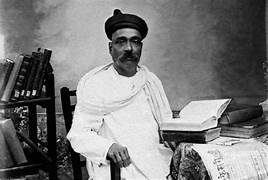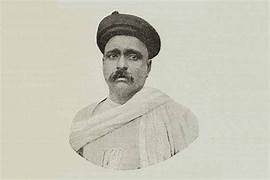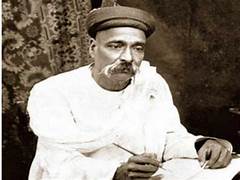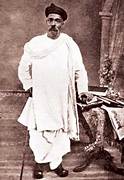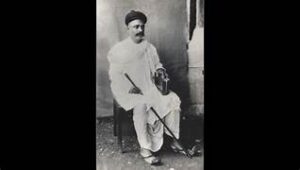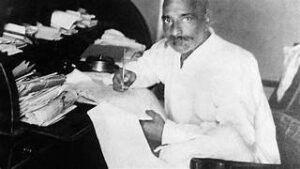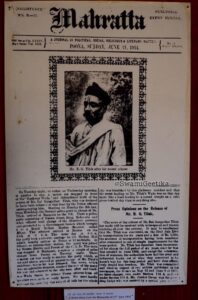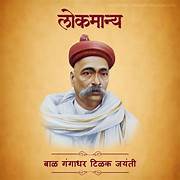Bal Gangadhar Tilak, often hailed as the “Father of Indian Unrest,” was a multifaceted figure in the Indian independence movement. His fervent nationalism and uncompromising stance against British rule earned him a prominent place in Indian history. Tilak’s advocacy for Swaraj, or self-rule, resonated deeply with the masses, especially through his concept of “Swarajya is my birthright, and I shall have it.”
Tilak, a firm believer in the power of education, emphasised the need of teaching Indian languages to empower the populace. He was instrumental in promoting indigenous education by establishing institutions such as the Deccan Education Society.
Tilak was also a vocal proponent of Hindu nationalism, advocating for the cultural and political resurgence of Hindu society. His efforts to revive and celebrate festivals like Ganesh Chaturthi as a means of fostering unity and pride among Hindus were instrumental in shaping the socio-cultural landscape of India.
However, Tilak’s confrontational approach towards the British government, particularly his endorsement of radical tactics. Such as passive resistance and civil disobedience, often brought him into conflict with the colonial authorities. His imprisonment on sedition charges, notably during the infamous trial of 1908, further solidified his image as a fearless leader willing to sacrifice personal liberties for the cause of Indian freedom.
Despite facing repression and incarceration, Tilak’s indomitable spirit and unwavering commitment to the cause of independence continued to inspire generations of freedom fighters. His legacy as a visionary leader and patriot endures, serving as a guiding light for the ongoing struggle for justice, equality, and self-determination in India.
Bal Gangadhar Tilak Early Life:
Bal Gangadhar Tilak, a prominent figure in India’s struggle for independence, was born on July 23, 1856, in Chikhali, a small village in present-day Maharashtra, India. He hailed from a middle-class Brahmin family and received his early education in Pune. Tilak’s deep interest in education and social reform became evident at a young age.
He pursued his higher education at Deccan College in Pune, where he studied mathematics and obtained a bachelor’s degree. Given his intellectual successes, Tilak was drawn to the sociopolitical challenges of the day. He became a leading proponent of independence from British colonial rule and self-government, actively participating in the Indian nationalist struggle.
Tilak’s early years were marked by his commitment to social causes and his efforts to uplift the masses through education. He firmly believed in the power of education to bring about social and political change. His association with the Deccan Education Society, which he co-founded in 1884, exemplified his dedication to educational reforms.
Bal Gangadhar Tilak’s early life laid the foundation for his future role as a revolutionary leader and freedom fighter, contributing significantly to the shaping of India’s struggle for independence. His emphasis on education, along with his ardent patriotism, foreshadowed the vital role he would play in the coming years.
Bal Gangadhar Tilak Education:
The Indian independence movement’s leading figure, Bal Gangadhar Tilak, was born in Ratnagiri, Maharashtra, on July 23, 1856. His education played a crucial role in shaping his thoughts and actions. Tilak pursued his early education in Pune and later studied at Deccan College. He displayed a keen intellect and a strong interest in social and political issues from a young age.
Tilak’s educational journey laid the foundation for his deep involvement in the socio-political landscape of India. Western ideologies and philosophies, especially the notion of nationalism, had an impact on him. His exposure to these ideas during his education played a significant role in shaping his vision for an independent India.
In addition to being a scholar, Bal Gangadhar Tilak was a fervent supporter of encouraging education among the general public. He believed that education was the key to empowering individuals and building a strong nation. Tilak’s commitment to education extended beyond his personal pursuits. He actively worked towards spreading awareness and knowledge among the common people. Emphasizing the importance of education as a tool for social transformation.
Tilak’s contributions to education and his relentless efforts to foster a sense of national pride and unity played a pivotal role in the Indian independence movement. His educational background equipped him with the skills to articulate his ideas effectively, making him a powerful orator and writer. In the backdrop of India’s independence movement. Bal Gangadhar Tilak’s legacy encourages the next generation by highlighting the connection between education and the quest for independence.
Bal Gangadhar Tilak Political Career:
Prominent Indian independence movement leader Bal Gangadhar Tilak made a lasting impression on the political climate of his nation. Known as the “Father of Indian Unrest,” Tilak was a fervent nationalist who advocated for the rights and freedom of the Indian people under British rule. He played a crucial role in shaping the early nationalist movement, emphasizing the need for self-rule and cultural revival.
Tilak’s political career was characterized by his unwavering commitment to the cause of Indian nationalism. He co-founded the All India Home Rule League in 1916, aiming to garner support for self-governance within the British Empire. His fiery speeches and writings inspired millions to join the struggle for independence, earning him both admiration and notoriety from the British authorities.
Throughout his career, Tilak faced numerous challenges and setbacks, including multiple arrests and periods of imprisonment. However, he remained resolute in his beliefs, using his time behind bars to further galvanize support for the nationalist cause.
In addition to his political activism, Tilak was a fervent supporter of social change and the rebirth of Indian culture. He emphasized the importance of education and self-reliance among the Indian populace, seeking to empower them to challenge colonial oppression and build a better future for themselves.
Even though he passed away in 1920, Bal Gangadhar Tilak’s contributions to the Indian freedom movement are still honoured today. Generations of Indians have been inspired by his bravery, tenacity, and unshakable commitment to the cause of independence.
Bal Gangadhar Tilak Social Reforms:
Prominent in the Indian independence struggle, Bal Gangadhar Tilak advocated for social changes in addition to being a strong nationalist. Though Tilak is most known for his political involvement, he also contributed significantly to social transformation in Indian society. One of his key focuses was on education. Tilak believed that education was essential for the empowerment of the masses, and he advocated for the promotion of literacy and scientific knowledge. He was instrumental in establishing the Deccan Education Society in Pune, which sought to provide education based on contemporary concepts.
Furthermore, Tilak actively worked towards eradicating social evils and promoting unity among different communities. He was a vocal critic of caste discrimination and untouchability, advocating for the upliftment of the oppressed classes. Tilak’s work in this field included writings and speeches emphasising the significance of social cohesion and eliminating discriminatory practices.
A progressive and inclusive society was at the core of Bal Gangadhar Tilak’s social reforms. By championing education and challenging social inequalities, he left a lasting impact on the social fabric of India. Contributing to the nation’s intellectual and moral development as it moved towards independence.
Bal Gangadhar Tilak Journalism:
Bal Gangadhar Tilak, a significant player in India’s independence movement, was both a political leader and a prolific journalist. Tilak’s approach to journalism was deeply rooted in his commitment to nationalistic ideals and his desire to awaken the masses to the cause of freedom. His newspaper, “Kesari” (The Lion), played a crucial role in disseminating his thoughts and rallying public support for the Indian independence movement.
Tilak believed in the power of the press to influence public opinion and shape the discourse on national issues. Through “Kesari,” he fearlessly criticized British colonial rule and advocated for self-rule. His writing style was fiery and strong, which appealed to the common people, making him a popular leader and journalist.
One of Tilak’s noteworthy contributions to journalism was his concentration on reaching a larger audience through vernacular languages, particularly Marathi. This strategy promoted solidarity across disparate populations by bridging the knowledge gap between the educated elite and the general public.
Tilak covered social issues like women’s rights, education, and caste prejudice in his journalism in addition to political ones. His writings fostered an Indian nationalism and pride that went beyond linguistic and geographic divides.
Despite facing censorship and legal challenges from the colonial authorities, Tilak remained undeterred in his pursuit of journalistic activism. His unrelenting dedication to the cause of freedom, as well as his impact writing, profoundly altered the Indian independence struggle, earning him the moniker “The Father of Indian Unrest.” Bal Gangadhar Tilak remains a significant character in Indian history, thanks in great part to his journalism efforts, which influenced the narrative of the country’s independence fight.
Bal Gangadhar Tilak Writing:
A key player in the Indian independence struggle, Bal Gangadhar Tilak was a complex individual who had a significant impact on colonial India’s political climate. Born in 1856, Tilak was not only a freedom fighter but also a social reformer, teacher, and journalist. He is often referred to as “Lokmanya,” meaning “accepted by the people” in Marathi. Tilak’s prominent writings, particularly in his journals Kesari and Maratha, were instrumental in rousing the masses and instilling nationalistic fervour.
“Swaraj is my birthright, and I shall have it,” he famously stated, inspiring the Indian independence movement. Tilak’s philosophy of self-rule and his emphasis on cultural pride and unity left an indelible mark on the Indian consciousness. Despite multiple imprisonments by British authorities, Tilak remained committed to the cause of Indian independence until his death in 1920. Generations of Indians have been motivated to fight for freedom and self-determination by him, and his legacy lives on.
Swadeshi Movement:
Bal Gangadhar Tilak was a prominent Indian nationalist leader and social reformer during the late 19th and early 20th centuries. He was a prominent player in India’s independence struggle and one of the Swadeshi Movement’s leaders.
The Swadeshi Movement was a significant phase in the Indian independence movement that emerged in response to the partition of Bengal by the British in 1905. The British divided Bengal into tribes in an attempt to incite conflict among Indians and stifle rising nationalism.
Bal Gangadhar Tilak, along with other leaders like Bipin Chandra Pal and Lala Lajpat Rai, actively supported the Swadeshi Movement. The main objective of the movement was to promote the use of Indian-made goods and encourage economic self-reliance to protest against British colonial policies.
Tilak emphasised the concept of “Swaraj” or self-rule and believed that economic independence was essential for establishing political freedom. He urged Indians to boycott British goods and promote the use of locally produced items. The movement gained traction as individuals across the country aggressively boycotted British items in favour of swadeshi (indigenous) alternatives.
The Swadeshi Movement had a profound impact on Indian society, fostering a sense of unity and nationalism among the people. It also marked the beginning of a series of protests and agitations against British rule. Although Bengal’s partition was subsequently reversed in 1911, the Swadeshi Movement had already sparked the spirit of independence and established the framework for future fights against colonial rule in India. The leadership of Bal Gangadhar Tilak and his support of swadeshi ideas were essential in determining the movement’s trajectory and motivating successive generations of Indians to want independence.
Bal Gangadhar Tilak Ganesh Utsav:
Bal Gangadhar Tilak, a prominent Indian nationalist leader, played a significant role in shaping the independence movement against British colonial rule. One of his notable contributions was the promotion of the Ganesh Utsav, an annual festival celebrating the birth of Lord Ganesha, the elephant-headed Hindu deity.
Tilak saw the Ganesh Utsav as an opportunity to unite people and foster a sense of patriotism. In 1893, he encouraged the public celebration of Ganesh Chaturthi on a large scale, turning it into a community event. He believed that by collectively celebrating festivals, Indians could strengthen their sense of unity and identity, transcending regional and linguistic differences.
The Ganesh Utsav, under Tilak’s guidance, became a platform for social and political gatherings. Visitors to the festival can participate in political discussions and propagate nationalist ideas through public walks, cultural events, and speeches. This strategic use of cultural and religious festivals helped mobilize masses and build a sense of solidarity among the people.
Tilak’s approach to the Ganesh Utsav not only contributed to the cultural fabric of India but also served as a means to promote the ideas of self-rule and independence. The attempts to use traditional festivals for nationalist goals had a long-term impact on the Indian independence struggle, and the Ganesh Utsav is still celebrated with excitement and fervour across the country today.
Bal Gangadhar Tilak Shivaji Jayanti:
Bal Gangadhar Tilak, a prominent figure in India’s struggle for independence, was a staunch advocate of Swaraj or self-rule. He was an important leader in the Indian National Congress and contributed significantly to the political awakening of the masses. Tilak’s focus on the importance of marking holidays like Shivaji Jayanti marked his contribution to the liberation cause. He was born on July 23, 1856.
Shivaji Jayanti commemorates the birth anniversary of Chhatrapati Shivaji Maharaj, the founder of the Maratha Empire. Tilak recognized the potential of such celebrations as a means to unite people and instill a sense of national pride. He believed that honoring historical figures like Shivaji Maharaj could inspire the masses to rise against colonial rule.
Tilak’s efforts to popularize Shivaji Jayanti were not merely symbolic. He saw it as a platform to foster a spirit of unity and nationalism among the diverse communities of India. By celebrating the life and legacy of Shivaji, Tilak aimed to create a sense of shared history and identity that transcended regional and cultural differences.
Tilak’s vision went beyond the mere observance of historical events; he envisioned these celebrations as a tool for political mobilization. Through the public celebration of Shivaji Jayanti, Tilak sought to instill a sense of pride in India’s glorious past and encourage the people to actively participate in the struggle for independence.
In essence, Bal Gangadhar Tilak’s emphasis on celebrating Shivaji Jayanti was a strategic move to blend cultural heritage with political awakening, ultimately contributing to the larger goal of achieving self-rule for India. The legacy of Tilak’s vision continues to resonate in the way India commemorates historical events and leaders, underscoring their role in shaping the nation’s identity and inspiring generations to come.
Ganesh Chaturthi Celebration:
Bal Gangadhar Tilak, a prominent Indian nationalist and social reformer, played a crucial role in transforming Ganesh Chaturthi into a mass public celebration during the late 19th and early 20th centuries. In an effort to unite people and instill a sense of nationalism. Tilak saw the potential of the Ganesh Chaturthi festival as a platform for social and political gatherings. He recognized the cultural significance of Lord Ganesha as a symbol of wisdom, prosperity, and good fortune.
Tilak cleverly utilized the festival to bring people together, cutting across caste and class barriers. He saw it as a way to create unity and solidarity among Indians during the difficult years of British colonialism. Ganesh Chaturthi, which was traditionally a private family affair, transformed into a grand public spectacle under Tilak’s influence.
Tilak encouraged the installation of large public idols of Lord Ganesha, turning the festival into a community event. The processions, cultural events, and public speeches during the festival became a powerful medium for conveying messages of social and political importance. Through the celebration of Ganesh Chaturthi, Tilak aimed to ignite the spirit of independence and patriotism among the masses.
Today, Ganesh Chaturthi remains one of the most widely celebrated festivals in India, with elaborate decorations, processions, and community participation. The festival continues to serve as a reminder of Bal Gangadhar Tilak’s vision of using cultural traditions to promote unity, cultural pride, and a sense of national identity.
Anti-Cow Slaughter Movement:
Bal Gangadhar Tilak, a prominent leader in the Indian independence movement during the late 19th and early 20th centuries, was known for his multifaceted approach to social and political issues. One of the noteworthy movements he championed was the Anti-Cow Slaughter Movement.
Tilak, recognizing the cultural and religious significance of cows in Hinduism, spearheaded efforts to protect these animals from slaughter. The cow, considered sacred in Hindu tradition, held a special place in the hearts of many Indians. Tilak’s movement aimed to create awareness about the importance of preserving the cow and preventing its slaughter, emphasizing the cultural and religious sentiments associated with the animal.
This movement was not only about religious sentiments but also tied to the larger context of resisting colonial rule. Tilak skillfully utilized the cow protection issue as a means to unite people across different communities against a common cause. By appealing to the cultural and religious sensitivities of the masses, he sought to foster a sense of unity and nationalism, encouraging people to come together for a shared cause.
Bal Gangadhar Tilak’s Anti-Cow Slaughter Movement, therefore, was not merely about the protection of a specific animal but was intricately connected to the broader themes of cultural identity, religious sentiments, and the larger struggle for independence from British colonial rule in India.
Formation of Home Rule Movement:
Bal Gangadhar Tilak played a significant role in the formation of the Home Rule Movement in India during the early 20th century. The movement aimed at achieving self-rule or Home Rule for India within the British Empire. Tilak, along with Annie Besant, was instrumental in initiating this movement.
In 1916, Tilak and Besant separately launched Home Rule Leagues in Maharashtra and Madras, respectively. The key objective was to promote self-governance and political freedoms for India. Tilak’s league was known as the All India Home Rule League, and it gained considerable support, especially in Maharashtra and other parts of the country.
Tilak’s involvement in the Home Rule Movement marked a shift in his political strategy. Earlier, he had been associated with extremist views and the demand for Swaraj or self-rule. However, with the Home Rule Movement, Tilak sought a more moderate approach to garner broader support for India’s political aspirations.
The Home Rule Movement sought constitutional reforms that would give India greater autonomy within the framework of the British Empire. It was a peaceful and constitutional agitation, with Tilak and Besant using newspapers, public speeches, and pamphlets to spread the message of Home Rule.
The movement gained momentum across the country, with people from different regions joining the cause. Although the Home Rule Movement did not achieve immediate success in securing self-rule, it played a crucial role in building political awareness and fostering a sense of unity among Indians.
Ultimately, the Home Rule Movement laid the groundwork for the larger independence movement. That would gain momentum in the subsequent decades, leading to India’s eventual independence in 1947. Bal Gangadhar Tilak’s role in initiating and promoting the Home Rule Movement demonstrated his commitment to India’s political emancipation through peaceful and constitutional means.
Role in Freedom Struggle:
Bal Gangadhar Tilak, often hailed as the “Father of Indian Unrest,” played a pivotal role in India’s struggle for independence against British colonial rule. Tilak was a multifaceted leader whose contributions ranged from journalism to politics and social reform. He fervently advocated for the idea of Swaraj, or self-rule, and inspired millions of Indians to rise against British oppression.
Tilak’s influential newspaper, Kesari, became a platform for disseminating nationalist ideas and awakening the masses to their rights and responsibilities. Through his writings, he highlighted the injustices of British rule and urged Indians to unite and demand their freedom.
A staunch advocate of Hindu nationalism, Tilak also worked to revive and promote Indian culture and traditions. He emphasized the significance of festivals like Ganesh Chaturthi as a means of fostering national unity and pride.
Tilak’s political activism was marked by his bold and uncompromising stance against British policies. He organized mass movements such as the Swadeshi Movement and the Home Rule Movement, which aimed at boycotting British goods and demanding self-governance for India.
Despite facing numerous arrests and periods of imprisonment, Tilak remained resolute in his pursuit of freedom. His famous statement, “Swarajya is my birthright and I shall have it,” encapsulates his unwavering determination and commitment to the cause of Indian independence.
Tilak’s legacy continues to inspire generations of Indians to strive for justice, equality, and freedom. His contributions to the freedom struggle have earned him a revered place in the annals of Indian history.
Educational Reforms:
Bal Gangadhar Tilak, a prominent figure in India’s struggle for independence, was not only a fervent nationalist but also a staunch advocate for educational reforms. Tilak recognized the pivotal role education played in shaping the destiny of a nation and believed in the empowerment of the masses through education. His changes in education were intended to remove obstacles that have restricted the general public’s access to education and information.
Tilak emphasized the need for education to be in vernacular languages, ensuring that it reached the majority of the population who were not proficient in English. He maintained that learning in one’s mother tongue would enhance one’s comprehension of cultural origins and be more successful.
Furthermore, Tilak advocated for a curriculum that combined traditional Indian knowledge with modern subjects. He believed that a holistic education system, blending the best of both worlds, would produce individuals capable of addressing contemporary challenges while staying connected to their cultural heritage.
In addition to these reforms, Tilak also stressed the importance of practical and vocational education. He envisioned an education system that not only imparted theoretical knowledge but also equipped students with skills that could contribute to the economic development of the nation.
Bal Gangadhar Tilak’s educational reforms were a reflection of his broader vision for a self-reliant and culturally rooted India. His ideas, though rooted in the early 20th century, continue to inspire discussions on educational policies and practices in contemporary India.
Tripartite Split:
Bal Gangadhar Tilak, a prominent figure in the Indian independence movement, played a crucial role in shaping the course of the struggle against British colonial rule. Understanding Tilak’s accomplishments requires considering his Tripartite Split ideology, which sought to bring about social and political reforms in India.
The first aspect of the Tripartite Split was the demand for “Swaraj” or self-rule. Tilak fervently advocated for the attainment of political independence, believing that Indians should govern themselves and determine their own destiny. His call for Swaraj resonated with many Indians and became a rallying cry for the nationalist movement.
The second element of Tilak’s Tripartite Split focused on the promotion of Indian culture and education. Recognizing the importance of cultural pride and knowledge in the fight against colonial oppression. Tilak emphasized the need for Indians to take pride in their heritage and traditions. He believed that a strong cultural foundation was essential for building a united and resilient nation.
The third component of Tilak’s ideology addressed the social aspect of Indian society. Tilak was a proponent of social reforms, advocating for the upliftment of marginalized communities and the eradication of discriminatory practices. He emphasized the importance of social unity and equality as integral to the overall progress of the nation.
In summary, Bal Gangadhar Tilak’s Tripartite Split encapsulated the interconnected goals of achieving political independence, promoting cultural pride and education, and advocating for social reforms. His multifaceted approach aimed at addressing the comprehensive needs of Indian society during the struggle for independence.
Sarvajanik Ganeshotsav:
Bal Gangadhar Tilak, a prominent leader during India’s struggle for independence, played a significant role in popularizing the Sarvajanik Ganeshotsav. A public celebration of the Hindu festival dedicated to Lord Ganesha. Tilak recognised the value of such celebrations in forging solidarity and promoting a sense of nationalism among people.
Tilak noted that political activity and public meetings were restricted by the British colonial authority in the late 1800s. Making it challenging for Indians to come together for a common cause. To counteract this, he regarded cultural and religious festivals as a way to bring people together in a nonpolitical setting.
Tilak chose the Ganesh Chaturthi festival as a platform for his initiative. In 1893, he encouraged the installation of public Ganesh idols and the celebration of the festival on a grand scale. This transformed the private and household-oriented festival into a community event, involving large processions, cultural programs, and public activities. The Sarvajanik Ganeshotsav became a means for people to express their collective identity and pride in their culture.
The festival allowed people from various backgrounds and communities to participate together, transcending social and economic barriers. Tilak’s vision was to create a sense of unity and solidarity among the masses, fostering a spirit of patriotism. The Sarvajanik Ganeshotsav thus became a tool for social and political awakening, serving as a platform for people to come together, celebrate their shared heritage, and lay the foundation for a united struggle against colonial rule.
Bal Gangadhar Tilak’s efforts in promoting the Sarvajanik Ganeshotsav not only revitalized the traditional festival but also contributed to the larger narrative of India’s fight for independence. His vision and strategic use of cultural events played a crucial role in mobilizing the masses and shaping the course of the freedom movement.
Opposition to Western Education:
Prominent in India’s freedom movement, Bal Gangadhar Tilak was an ardent supporter of Indian independence and cultural rebirth. One of his significant contributions was his opposition to Western education without disregarding its merits entirely. Tilak believed that while Western education offered valuable knowledge and skills, it was essential for Indians to preserve their cultural identity and heritage.
He argued that blindly adopting Western education could lead to the erosion of India’s traditional values and beliefs. Tilak emphasized the importance of incorporating indigenous knowledge and teachings into the education system to foster a sense of pride and self-confidence among Indians.
Tilak’s stance on education was deeply rooted in his nationalist ideology. He believed that a strong sense of cultural identity was crucial for India to assert itself against British colonial rule. By promoting indigenous education, Tilak sought to empower Indians to challenge the hegemony of Western imperialism and assert their right to self-governance.
Despite his opposition to certain aspects of Western education, Tilak recognized its potential to impart scientific and technological knowledge that could benefit India’s progress. However, he advocated for a balanced approach that combined Western learning with a strong foundation in Indian culture and traditions.
In essence, Bal Gangadhar Tilak’s opposition to Western education without sentence length underscored his commitment to preserving India’s cultural heritage while embracing the benefits of modern knowledge. He believed that a harmonious blend of Eastern wisdom and Western learning was essential for India’s holistic development and eventual liberation from colonial rule.
Opposition to Colonial Rule:
During the British Raj, a key player in the Indian independence struggle was Bal Gangadhar Tilak, who opposed colonial rule. Born in 1856, Tilak was a multifaceted leader who advocated for self-rule and took a staunch stance against British imperialism. He was a strong proponent of Swaraj, or self-rule, and believed that political freedom was essential for the progress and well-being of the Indian people.
In his writings and speeches, Tilak expressed his disapproval of colonial rule, criticising British policies and advocating for Indian unification. He founded and edited newspapers such as Kesari (in Marathi) and The Maratha (in English), using these platforms to spread his nationalist ideas and rally support for the cause. Tilak’s famous quote, “Swaraj is my birthright, and I shall have it.” Encapsulates his unwavering commitment to the struggle for Indian independence.
Tilak also played a pivotal role in the socio-political landscape through his efforts to promote education and cultural awareness. He encouraged the celebration of festivals like Ganesh Chaturthi as a means of fostering a sense of unity and national pride among the Indian masses.
His opposition to the British government was not limited to intellectual pursuits. Tilak actively participated in political activities and faced imprisonment on several occasions. His involvement in the Indian National Congress, coupled with his advocacy for civil rights and constitutional reforms, marked him as a leader committed to the cause of Indian independence.
Bal Gangadhar Tilak’s legacy endures as a symbol of resistance against colonial oppression, and his contributions continue to inspire generations of Indians in their pursuit of freedom and self-determination.
Multiple Imprisonments:
Bal Gangadhar Tilak, a prominent figure in India’s struggle for independence, faced multiple imprisonments during his lifetime as he ardently advocated for the country’s freedom from British colonial rule. Tilak, born in 1856, was a multifaceted leader, journalist, teacher, and social reformer. His fervent commitment to the cause of Swaraj, or self-rule, led to several confrontations with the British authorities.
Tilak’s first imprisonment happened in 1897, when he was accused with sedition for works critical of British government policy. He served a prison term in Mandalay, Burma. His incarceration, however, did not dampen his spirit; instead, it further fueled his determination to work towards India’s independence.
Tilak was imprisoned again in 1908, this time for his role in the anti-partition movement against the Bengal division. His arrest and subsequent trial marked a significant chapter in the struggle against British imperialism. Tilak’s famous statement during the trial, “Swarajya is my birthright, and I shall have it,” became a rallying cry for the independence movement.
Despite the challenges, Tilak continued to inspire and mobilize people. He faced yet another imprisonment in 1916, this time for his support of the Home Rule Movement, which aimed to attain self-rule for India within the British Empire. Tilak’s incarceration only heightened his popularity, turning him into a symbol of resistance and fortitude.
Bal Gangadhar Tilak’s multiple imprisonments symbolize his unwavering commitment to the cause of Indian independence. It was significantly shaped by his fortitude in the face of hardship and his capacity to inspire mass support. Tilak’s legacy endures as a testament to the indomitable spirit of those who fought for India’s freedom from colonial rule.
Bal Gangadhar Tilak Extremism:
Prominent in the Indian independence struggle, Bal Gangadhar Tilak is frequently linked to his nationalist zeal and support of self-government. His approach, at times, leaned towards what was perceived as extremism during the colonial period. Tilak was a key proponent of the militant and assertive strand of the freedom struggle, advocating for the use of direct action to achieve political goals.
One of his notable contributions was the promotion of the concept “Swaraj is my birthright, and I shall have it.” Emphasizing the inherent right of Indians to govern themselves. Tilak’s ideology, especially during the early 20th century, became more radical as he expressed dissatisfaction with moderate approaches to gaining independence.
Tilak’s involvement in the Home Rule Movement further underscored his commitment to achieving self-rule through mass mobilization. Although his methods were sometimes seen as extreme by the British colonial authorities. They resonated with a significant portion of the Indian population who sought a more assertive and immediate path to independence.
It is crucial to understand Tilak’s perspective in the context of the challenging political climate of the time, marked by frustration with the perceived lack of progress through peaceful means. While some viewed his actions as extreme, others saw them as a necessary response to the oppressive colonial regime. Reflecting the complex dynamics of the Indian independence movement.
Bal Gangadhar Tilak Freedom of Speech:
Bal Gangadhar Tilak, a prominent figure in India’s struggle for independence, was a staunch advocate of freedom of speech. Born in 1856, Tilak was not only a political leader but also a social reformer and journalist. He firmly believed that the right to express one’s thoughts and opinions was fundamental to a democratic society. Tilak utilized his platform as a journalist to disseminate nationalist ideas and critique colonial policies.
One of his famous quotes reflects his viewpoint on free speech: “Swaraj is my birthright, and I shall have it.” Tilak’s emphasis on the concept of “Swaraj” or self-rule was closely linked to the idea of freedom of speech. He thought that people had an intrinsic right to express opinions, confront repressive officials, and help shape their country’s future.
Tilak’s commitment to freedom of speech extended beyond the realm of journalism. He actively engaged in public speaking, using his oratory skills to inspire and mobilize the masses. His approach was characterized by a fearless articulation of his beliefs, even in the face of colonial suppression.
However, Tilak’s advocacy for freedom of speech wasn’t just limited to political discourse. He recognized the significance of diverse perspectives in shaping a vibrant society. In his vision for a free India, he envisioned a space where individuals could express their thoughts openly, fostering intellectual growth and societal progress.
Bal Gangadhar Tilak’s contributions to the freedom struggle and his unwavering commitment to the principle of freedom of speech continue to inspire generations. The importance of the freedom of expression in achieving justice, equality, and a democratic society is underscored by his legacy.
Role in Indian National Congress:
Bal Gangadhar Tilak played a crucial role in the Indian National Congress during the late 19th and early 20th centuries. He was one of the prominent leaders of the Congress and is often referred to as the “Father of the Indian Unrest” for his advocacy of radical and militant methods to achieve self-rule. Tilak’s influence within the Congress was significant, and he played a key role in shaping the party’s agenda and strategy during a critical phase of India’s struggle for independence.
Tilak’s method was distinguished by a strong dedication to the cause of Swaraj (self-rule) and an emphasis on public mobilisation. He supported regular people joining the independence fight and thought that symbols of culture and religion might bring people together. His famous slogan “Swaraj is my birthright, and I shall have it” became a rallying cry for the nationalist movement.
However, Tilak’s methods and ideology sometimes led to differences within the Indian National Congress. While he was a staunch advocate of direct action and mass protests, there were other leaders like Gopal Krishna Gokhale who favored a more moderate and constitutional approach. This ideological divide eventually contributed to the split in the Congress in 1907.
Despite these differences, Bal Gangadhar Tilak’s contributions to the Indian National Congress were significant in shaping the early phase of the independence movement. His emphasis on the empowerment of the common people and his efforts to forge a united front against British colonial rule left a lasting impact on the trajectory of India’s struggle for freedom.
Bal Gangadhar Tilak Legacy:
Bal Gangadhar Tilak, a prominent leader of the Indian independence movement, is often hailed as the “Father of Indian Unrest.” He was a key figure in advocating for Swaraj, or self-rule, as a fundamental right for Indians. Tilak’s slogan, “Swaraj is my birthright, and I shall have it,” resonated deeply with the masses and ignited a fervor for independence across the nation.
Tilak was instrumental in mobilizing people through his writings and speeches. He used his newspapers, Kesari and The Mahratta, to disseminate his ideas and criticize British rule. His ability to articulate the aspirations and grievances of the Indian people made him a revered leader.
A staunch believer in the power of education and culture, Tilak emphasized the need to promote Indian heritage and values. He brought back the public celebration of Shivaji Jayanti and Ganesh Chaturthi, which promoted patriotism and solidarity. These celebrations became platforms for political discourse and mobilization.
Tilak’s legal battles, particularly his trials for sedition, showcased his resilience and commitment to the cause of independence. Despite being imprisoned multiple times, he remained undeterred and continued to inspire others.
His contributions to the freedom struggle laid a strong foundation for future leaders like Mahatma Gandhi and Jawaharlal Nehru. Tilak’s legacy is not only in his political activism but also in his vision for a free and self-reliant India. His efforts paved the way for the eventual success of the Indian independence movement, making him an enduring symbol of patriotism and courage.
Death:
Bal Gangadhar Tilak, a prominent figure in the Indian independence movement, passed away on August 1, 1920. Tilak was born on July 23, 1856, in Ratnagiri, Maharashtra, and became a key leader in the fight against British colonial rule in India.
Tilak was a multifaceted personality, known for his roles as a teacher, journalist, and social reformer. He played a crucial role in promoting the concept of “Swaraj” or self-rule and was a strong advocate for the idea that independence was the birthright of every Indian. His catchphrase, “Swaraj is my birthright, and I shall have it,” became a catchphrase for the anti-slavery struggle.
Tilak’s contributions to the Indian nationalist cause led to his imprisonment on several occasions. He was a prominent leader in the Indian National Congress and later played a significant role in the formation of the All India Home Rule League. Despite facing challenges and opposition, Tilak continued to inspire millions of Indians with his dedication to the cause of freedom.
Bal Gangadhar Tilak died in Mumbai, leaving a legacy of heroism, patriotism, and unwavering dedication to the cause of independence. His death marked the end of an era, but his ideas and teachings continued to shape the course of India’s struggle for freedom in the years that followed.
Fact:
The Indian independence movement’s leading figure, Bal Gangadhar Tilak, was born in Chikhali, Maharashtra, on July 23, 1856. He played a key role in shaping the political landscape during the early 20th century. Tilak was a multifaceted personality, being a freedom fighter, social reformer, and journalist.
One of his significant contributions was the promotion of the concept “Swaraj” or self-rule, which became a rallying cry for the Indian independence movement. Tilak was a strong advocate of civil rights and played a crucial role in awakening national consciousness among the masses. He emphasized the need for active participation of the common people in the struggle for independence.
Bal Gangadhar Tilak was a prolific writer and editor. He founded the newspapers Kesari (in Marathi) and The Maratha (in English) to propagate nationalist ideas. His famous quote, “Swaraj is my birthright, and I shall have it,” became a mantra for the Indian freedom fighters. Indian unity was greatly enhanced by Tilak’s attempts to bring people together across language and cultural divides.
He faced numerous challenges and spent several years in prison for his anti-British activities. Despite the hardships, Tilak remained committed to the cause of India’s independence until his death on August 1, 1920. His legacy endures as he continues to be remembered as one of the key architects of India’s struggle for freedom.

